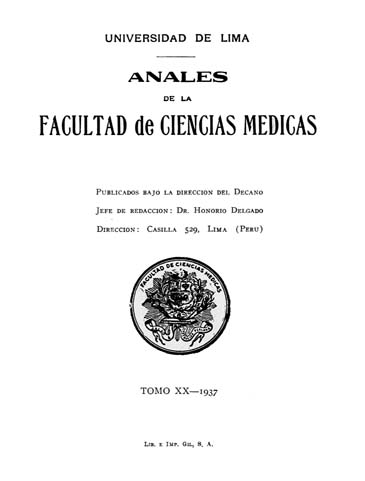Psychopathology and clinical definition of schizophrenia
DOI:
https://doi.org/10.15381/anales.v20i1.9757Abstract
Dementia praecox or schizophrenia, psychosis common in youth and fundamentally conditioned by heredity age has an external cause appear without evident and manifest a special set of organic and mental symptoms. Among the latter are some characteristic. Hence the interest of psychopathological study of this psychosis. The most important psychopathological manifestations of schizophrenia are the following: 1 In the field of perceptual activity: the impression of strangeness of the world, pseudopercepciones body sensitivity or verbal hallucinations and pseudo-hallucinations verbomotrices, especially the thought that makes noise, the echo of thinking, dialogical voices and commentary of the action itself. In general, pseudopercepciones genuinely schizophrenic experiences are distinguished by being the subject lives without assimilating into their autonomous existence. Regarding 2nd thought: the disintegration, the precategorial form (archaic symbolism, autism, participation in the alien being), thoughts, facts, subtraction, publishing and thought blocking and primary delusions or delusions (direct failure trial, establishing relationships for no reason). Overall, schizophrenic thinking can be characterized as follows: descabal concrete content, breath frustráneo active, impersonal and function mediate primary substance. 3rd sentiment goes to the emotional vacuum with some frequency and qualitative abnormalities manifested as: ambivalence, feelings of (false) anafectividad, taxation, deprivation etc. 4th In terms of instinct, the most significant is the emergence of dark titanic forces at once puzzled resuscitation affective and value of personal past attitudes, manifesting childhood not as innocent children but, adulterated, as current and perverse, because of the consciousness of the adult patient reacted with a mixture of malice and coarseness, attached to moved and violated in his existential insertion spirit unleashed sexuality mixture. 5th action in schizophrenia is as relevant deviations: impulsive acts, stereotypies, mannerisms, stupor, ambitendency, negativism, ecopraxia, catatonic phenomena etc. The 6th-consciousness shows alienation will almost specific for schizophrenia, which can reach the complete depersonalization and paralysis of self. 7th The personality loses its unity and values perspective, effective and obvious reasons: the perennial spiritual objectivity is replaced by the subjective caprice that changes with the time and not based on anything. Disorders of memory, attention, consciousness, save the impotence of intentional, are rare and uncharacteristic; the awareness of time are still poorly understood. Schizophrenia is not a disease entity but a clinical, with various forms, likely to become a peer group psychosis. Differential diagnosis has three fronts: 1 organic psychoses that of known origin, medical conditions that may occur with schizophrenic symptoms and even "pseudoesquizofrenias" or "symptomatic schizophrenia"; 2nd the psychoses of unknown origin, especially repressive manic psychosis; 3rd neuroses or pseudoesquizofrénicas reactions that appear in abnormal personalities or predisposed. Of the former differs by the lack of apparent etiology of the latter by the diversity of the overall picture and the evolution of the past that is not understandable in relation to external vicissitudes and premorbid personality.Downloads
Published
1937-07-19
Issue
Section
Trabajos originales
License
Copyright (c) 1937 Honorio Delgado

This work is licensed under a Creative Commons Attribution-NonCommercial-ShareAlike 4.0 International License.
Those authors who have publications with this magazine accept the following terms:
- Authors will retain their copyrights and guarantee the journal the right of first publication of their work, which will be simultaneously subject to Creative Commons Attribution License that allows third parties to share the work as long as its author and its first publication this magazine are indicated.
- Authors may adopt other non-exclusive licensing agreements for the distribution of the version of the published work (eg, deposit it in an institutional electronic file or publish it in a monographic volume) provided that the initial publication in this magazine is indicated.
- Authors are allowed and recommended to disseminate their work over the Internet (eg: in institutional telematic archives or on their website) before and during the submission process, which It can produce interesting exchanges and increase quotes from the published work. (See El efecto del acceso abierto ).
How to Cite
1.
Delgado H. Psychopathology and clinical definition of schizophrenia. An Fac med [Internet]. 1937 Jul. 19 [cited 2024 Aug. 17];20(1):1-29. Available from: https://revistasinvestigacion.unmsm.edu.pe/index.php/anales/article/view/9757















